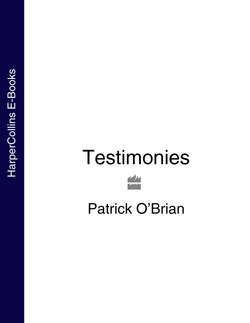Читать книгу Testimonies - Patrick O’Brian - Страница 6
Preface
ОглавлениеTo read a first novel by an unknown author which, sentence by sentence and page by page, makes one say: he can’t keep going at this pitch, the intensity is bound to break down, the perfection of tone can’t be sustained – is to rejoice in an experience of pleasure and astonishment. Patrick O’Brian’s Testimonies makes one think of a great ballad or a Biblical story. At first one thinks the book’s emotional power is chiefly a triumph of style; and indeed the book is remarkable enough for the beauty and exactness of phrasing and rhythm which can only be characterized by quotation:
It was September when I first came into the valley: the top of it was hidden in fine rain, and the enclosing ridges on either side merged into a gray, formless cloud. There was no hint of the two peaks that were shown on the map, high and steep on each side of the valley’s head. This I saw from the windows of the station cab as it brought me up the mountainous road from the plains, a road so narrow that in places the car could barely run between the stone walls. All the way I had been leaning forward in my seat, excited and eager to be impressed: at another time the precipices that appeared so frequently on the left hand would have made me uneasy, but now they were proofs of a strange and wilder land, and I was exhilarated.
… There may be things more absurd than a middle-aged man in the grip of a high-flung romantic passion: a boy can behave more foolishly, but at least in him it is natural.
I kept away. I read Burton in the mountains. We had a spell of idyllic weather, and the soft loving wind was a torment to me.
I would not pass those days again. I knew I was a ludicrous figure, and it hurt all the more. I did not eat. I could not read, I could not sleep. I walked and walked, and when one day I broke a tooth on a fruit stone I welcomed the pain.
Long before I had engaged to help with the yearly gathering of the sheep for the shearing, and now the time came around. The boy came up to ask if I would meet Emyr on the quarry road early the next morning. I wondered how I should face him, but there was nothing for it and I said I should be very glad.
But the reader soon forgets the style as such – a forgetting that is the greatest accomplishment of prose – in the enchantment and vividness of the story. Joseph Aubrey Pugh, an Oxford don who has given up his teaching post and come to live in a secluded Welsh valley, falls in love with Bronwen Vaughan, the wife of a young farmer who is his neighbour. She in turn, but less quickly, falls in love with him; and she is estranged from her husband, an admirable man in many ways, but one who has compelled her to submit to some unnamed, brutal sexual perversion. When a famous preacher whose advances she has rejected with contempt persuades the entire community that she has committed adultery with Pugh – an accusation which is false in a physical sense but true emotionally – she is poisoned or poisons herself. This summary is more unjust than most, for the comparative simplicity of the action when thus formulated conceals the labyrinthine complexity of attitude, motive, and feeling.
For example, Mr Pugh and Mrs Vaughan, as they call each other to the end, come to a recognition of their love for each other without speaking explicitly of love at all, while they are arguing mildly and pensively about whether civilization makes human beings happy or unhappy. The over-civilized man condemns civilization and the beautiful, spontaneous woman defends it, both of them unknowingly and passionately evaluating civilization as they do because they are in love with each other, the man condemning civilization because it is the great obstacle between him and another man’s wife, the woman praising it because the man is entirely a product of it. The reader, drawn forward by lyric eloquence and the story’s fascination, discovers in the end that he has encountered in a new way the sphinx and riddle of existence itself. What O’Brian has accomplished is literally and exactly the equivalent of some of the lyrics in Yeats’ The Tower and The Winding Stair where within the colloquial and formal framework of the folk poem or story the greatest sophistication, consciousness and meaning become articulate. In O’Brian, as in Yeats, the most studied literary cultivation and knowledge bring into being works which read as if they were prior to literature and conscious literary technique.
– DELMORE SCHWARTZ, in the Partisan Review, August 1952
